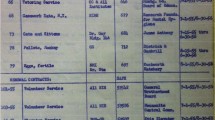
Overview
- Places the development of computer science as a profession within political and cultural contexts from the end of World War II through the 1960s
- Considers contests for standardization of computer terminology as they reflect efforts from people in military, academic, professional, and corporate sectors to gain control of technology development and deployment
- Considers the effects of corporate values on post-WWII computer development
- Traces the history of the professionalization of computer science as a unique discipline and profession apart from mathematics, physics, and electrical engineering
- Considers the cultural contests for standardization of computer terminology within a linguistic framework
Part of the book series: History of Computing (HC)
Access this book
Tax calculation will be finalised at checkout
Other ways to access
About this book
When viewed through a political lens, the act of defining terms in natural language arguably transforms knowledge into values. This unique volume explores how corporate, military, academic, and professional values shaped efforts to define computer terminology and establish an information engineering profession as a precursor to what would become computer science.
As the Cold War heated up, U.S. federal agencies increasingly funded university researchers and labs to develop technologies, like the computer, that would ensure that the U.S. maintained economic prosperity and military dominance over the Soviet Union. At the same time, private corporations saw opportunities for partnering with university labs and military agencies to generate profits as they strengthened their business positions in civilian sectors. They needed a common vocabulary and principles of streamlined communication to underpin the technology development that would ensure national prosperity and military dominance.- investigates how language standardization contributed to the professionalization of computer science as separate from mathematics, electrical engineering, and physics
- examines traditions of language standardization in earlier eras of rapid technology development around electricity and radio
- highlights the importance of the analogy of “the computer is like a human” to early explanations of computer design and logic
- traces design and development of electronic computers within political and economic contexts
- foregrounds the importance of human relationships in decisions about computer design
This in-depth humanistic study argues for the importance of natural language in shaping what people come to think of as possible and impossible relationships between computers and humans. The work is a key reference in the history of technology and serves as a source textbook on the human-level history of computing. In addition, it addresses those with interests in sociolinguistic questions around technology studies, as well as technology development at the nexus of politics, business, and human relations.
Similar content being viewed by others
Keywords
Table of contents (8 chapters)
-
Front Matter
Reviews
“Longo’s genealogical history of computing vocabularies and the field of computer science’s formation provides an important insight into both computer science’s technical origins as well as its culture, one that valorizes looking to a tomorrow linearly constructed from today’s technologies.” (Kendall Giles, Technology and Culture, Vol. 65 (2), April, 2024)
Authors and Affiliations
About the author
Bernadette Longo is an Associate Professor in the Department of Humanities at New Jersey Institute of Technology. She is also the author of the books Edmund Berkeley and the Social Responsibility of Computer Professionals (2015), Spurious Coin: Science, Management, and a History of Technical Writing (2000), and the IEEE Guide to Writing in the Engineering and Technical Fields (2017). Among her other publications, she is co-editor of Critical Power Tools: Technical Communication and Cultural Studies (2006) and Transnational Research in Technical Communication: Realities and Reflections (forthcoming). Dr. Longo is a senior member of the Institute of Electrical and Electronics Engineers (IEEE) and serves on the Association for Computing Machinery (ACM) History Committee.
Accessibility Information
Bibliographic Information
Book Title: Words and Power
Book Subtitle: Computers, Language, and U.S. Cold War Values
Authors: Bernadette Longo
Series Title: History of Computing
DOI: https://doi.org/10.1007/978-3-030-70373-8
Publisher: Springer Cham
eBook Packages: Computer Science, Computer Science (R0)
Copyright Information: Springer Nature Switzerland AG 2021
Hardcover ISBN: 978-3-030-70372-1Published: 27 July 2021
Softcover ISBN: 978-3-030-70375-2Published: 28 July 2022
eBook ISBN: 978-3-030-70373-8Published: 26 July 2021
Series ISSN: 2190-6831
Series E-ISSN: 2190-684X
Edition Number: 1
Number of Pages: X, 143
Number of Illustrations: 3 b/w illustrations
Topics: History of Computing, Natural Language Processing (NLP), US Politics, Information Systems and Communication Service, Computational Linguistics, Modern History



